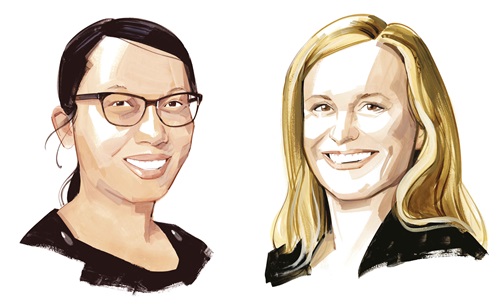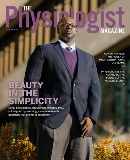Tips for Trainees
How to find the right environment and sharpen your career development skills.
 Each issue, we ask a student
or early-career member to pose their career questions to an established investigator and mentor. Here, Yanna Tian, PhD, a postdoc associate in the Kathleen M. Caron Lab in the Cell Biology and Physiology Department at the University of North Carolina-Chapel
Hill School of Medicine, asks Jill Barnes, PhD, associate professor in the Department of Kinesiology at University of Wisconsin-Madison, questions about how to find the right training environment.
Each issue, we ask a student
or early-career member to pose their career questions to an established investigator and mentor. Here, Yanna Tian, PhD, a postdoc associate in the Kathleen M. Caron Lab in the Cell Biology and Physiology Department at the University of North Carolina-Chapel
Hill School of Medicine, asks Jill Barnes, PhD, associate professor in the Department of Kinesiology at University of Wisconsin-Madison, questions about how to find the right training environment.
Q: What are the important things a trainee should consider when looking for a good training environment?
A: There are a few important things to consider: first, the ability to communicate with your mentor. This means
feeling comfortable enough to have difficult discussions and feeling like your mentor will listen to your questions or concerns.
Second, that the laboratory has a good track record of productivity. Having a good training environment means being able to meet your goals in a reasonable amount of time; therefore the laboratory should be productive. This does not necessarily mean that the best environment is the most productive laboratory, but in an unproductive laboratory it will be difficult to meet your training and career goals.
Third, the “temperature” of the laboratory environment, meaning how well do other trainees or staff interact? The mentor of the laboratory often sets the tone of the environment, but you will be spending a lot of time working closely with other trainees and staff. Are you able to communicate with them? Do you feel like they would be supportive or your work?
Q: If you are in a training environment that is not supportive for you, what should you do and when should you consider changing?
A: This is a difficult situation. Reaching out to a trusted person who is further
along in their career is highly recommended. Sometimes we are in difficult situations because of the career stage, and it may help to get a different perspective. Sometimes this is an issue of miscommunication; other times this may be different personalities
that do not work well together, and occasionally this may be an issue of a toxic environment.
Regardless, considering a few questions with a trusted person may be helpful. Is there a new way to approach the situation? Is there a way to communicate expectations or confusion with the mentor? Is there someone else in the environment who may be able to provide support to have these difficult conversations with the mentor? If these items have been explored and nothing is working, it may be time to think about finding a different training environment. That could be a laboratory down the hall, or it could be a laboratory at a different institution.
Q: In addition to technical advice on performing experiments, what other skills should a graduate student or postdoc be trained in for a career in academia?
A: Other important career development skills for either
academia or industry are critical thinking skills to be able to evaluate and discuss scientific literature; verbal and written communication skills to effectively communicate your science to a broad audience; project management skills and the ability
to develop protocols, timelines and strategies to complete a project (on time!); and mentoring and teaching technical, scientific and communication skills to more junior trainees.
Q: When should a trainee apply for their first fellowship grant? Should a trainee seek advice from other mentors when preparing a fellowship application?
A: This is a great question. In my opinion, the timing of
applying for the first fellowship grant should be highly individualized. Many mentors and institutions utilize individual development plans, known as IDPs, to set goals and timelines and to create steps to complete the goals. These should be individualized
based on the trainee’s strengths and weaknesses.
Because of this, the timing of applying should also be individualized and sometimes is based on external factors, such as eligibility, deadlines or funding availability. For any fellowship application, getting input (informally) or inviting a person as a co-mentor is a great idea to provide additional expertise and a different perspective.
Q: Describe some successful ways that trainees can promote their research to other scientists.
A: Many people use social media to promote their research, but there are many other ways of promoting it too. This could
include presenting posters or talks at your institution, as well as local or national meetings, workshops and conferences.
In addition, scientific conferences allow a lot of time to ask questions of other scientists and trainees, connect with peers and network with experts in the research area. Lastly, writing a review article takes a lot of time but is a valuable way to share and summarize what is known about your specific area of research.
Got a career question you'd like to submit? Email it to tphysmag@physiology.org. We may use it in an upcoming Mentoring Q&A.
This article was originally published in the January 2024 issue of The Physiologist Magazine. Copyright © 2024 by the American Physiological Society.
“Scientific conferences allow a lot of time to ask questions of other scientists and trainees, connect with peers and network.”
The Physiologist Magazine
Read the Latest Issue
Don’t miss out on the latest topics in science and research.
View the Issue Archive
Catch up on all the issues of The Physiologist Magazine.
Contact Us
For questions, comments or to share your story ideas, email us or call 301.634.7314.


